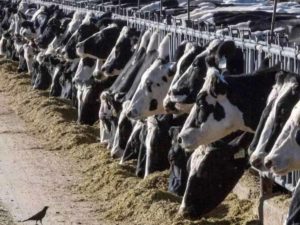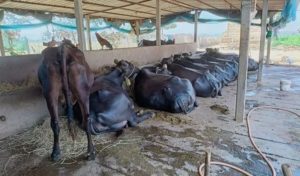As that happened, many people learned that these vaccines need to be super-cooled to remain viable during transport and storage. Dry ice, the product made when carbon dioxide is treated with cold and pressure and becomes a solid, is a key ingredient in those vaccine’s cold-chain requirements.
Dry ice is an important coolant because it remains at very low temperatures, but when it melts it returns to a gas and doesn’t cause sogginess in the materials it had been cooling.
Wisconsin cheesemakers and those in allied dairy businesses grew concerned as they learned more about these cold-chain needs of the vaccines and the potential impact of a dry ice shortage. What many dairy farmers and others who don’t manufacture dairy products themselves may not know, is that dry ice is vitally important for preserving dairy cultures as they make their way to cheesemakers and other dairy processors.
In a letter dated December 4, the Wisconsin Cheesemakers Association (WCMA) told top officials at the Centers for Disease Control and Prevention, Department of Defense and Department of Health and Human Services that they welcome and applaud the swift distribution of Covid-19 vaccines, but are concerned that the dry ice needed to keep these vaccines viable could harm the dairy industry and asked for help to make sure that doesn’t happen.
Their concern is that the dairy industry requires super-chilled dairy cultures, those benign bacteria that are used to produce cheese, yogurt and other popular dairy products. Dairy cultures must be kept at sub-zero temperatures (just like the vaccines) prior to use.
“There is no substitute for dry ice in the distribution and storage of dairy cultures worldwide,” the WCMA told HHS Secretary Alex Azar, Christopher Miller, acting Secretary at Defense and Robert Redfield, MD, director of the CDC.
“As the United States plans for chilled distribution of Covid-19 vaccines we write to make you aware of concerns within our industry related to the associated increase in demand for dry ice,” the letter said. “The nation’s dairy industry requires a daily supply of dry ice and we ask that you prioritize a critical amount of dry ice to maintain daily production of our essential and perishable dairy foods.”
“Without the dry ice necessary to keep dairy cultures in condition, “millions of pounds of fresh milk each day could not be processed and would be dumped, reducing consumer food supplies and devastating dairy farmers and cheesemaking companies and cooperatives,” the association said in its letter.
Three companies, all with manufacturing facilities in Wisconsin, make the majority of the world’s supply of dairy cultures and as such are significant consumers of dry ice. Together, these companies and their distributors require 350,000 pounds of dry ice per week to supply dairy manufacturers with the dairy cultures they need.
The WCMA letter also reminded the officials that the U.S. dairy industry is responsible for $620 billion in U.S. economic impact and also is part of the “critical mission of feeding the world.”
Mathew Bartkowiak, director of Strategic Relationships with Nelson-Jameson, a Marshfield, Wisconsin-based supplier to the dairy and food industry, said his company has a “small city” of deep freezers to keep cultures at the right temperatures for the dairy industry, a core customer for the company.
“We started to get a bit concerned a few weeks ago when it became clear what the actual parameters were that the vaccines would require,” he told us. The WCMA and allied industry partners like Nelson-Jameson reached out to Wisconsin’s Congressional delegation and joined with the companies making these dairy cultures to sound their concerns.
Rebekah Sweeney, communications, education, and policy director for WCMA reported that in very short order, the concern about preserving access to dry ice for the dairy industry has been heard.
Senator Tammy Baldwin (D-Wisconsin) responded quickly to WCMA’s concerns by holding meetings with Pfizer officials — that’s the drug company that has produced a coronavirus vaccine and has now been granted approval to begin shipping it to health officials. Another vaccine from Moderna, will also likely receive Emergency Use Authorization from the U.S. Food and Drug Administration. It also requires a cold chain for storage and transportation and will likely also use substantial amounts of dry ice.
Baldwin’s meetings also included dry ice manufacturers. Of the various vaccines that have been tested, Pfizer’s requires the coldest temperatures during transport and storage, and as such requires the most dry ice. Sweeney said that as a result of those meetings, the WCMA learned that the bulk of dry ice used in Pfizer’s vaccine production and distribution will be made on-site at a facility Pfizer has in Kalamazoo, Michigan.
Besides what it can manufacture itself, Pfizer officials said the cold-chain for their vaccine will require additional amounts of dry ice daily as they ship vaccines to all 50 states.
But the concerned dairy officials and dairy-related businesses have learned that this is unlikely to hurt the dairy culture industry. Dry ice manufacturers have plans in place to prioritize “essential customers'” needs and the dairy industry is considered an essential customer, which reassured those raising concerns in the WCMA.
Also, dry ice manufacturers – in particular, Airgas indicated that they could, with minimal advance notice, ramp up production by 25 to 50 percent. This would be achieved by adding a second manufacturing shift in some of their plants and by accessing additional carbon dioxide gas, which is available to them. Signals from that industry indicate that additional dry ice manufacturing capacity is available.
The WCMA will “continue its advocacy push for industry access to dry ice throughout this period of heightened demand,” Sweeney said.
Health officials estimate that it could take six to eight months to get enough Americans vaccinated to achieve what is called “herd immunity” meaning that the need for dry ice and cold-chain storage could last well into the summer and possibly beyond.










